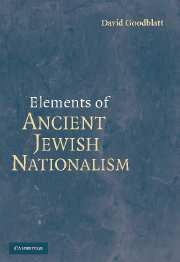Book contents
- Frontmatter
- Contents
- List of Abbreviations
- Preface
- 1 Theoretical Considerations: Nationalism and Ethnicity in Antiquity
- 2 Constructing Jewish Nationalism: The Role of Scripture
- 3 Constructing Jewish Nationalism: The Hebrew Language
- 4 A Kingdom of Priests: The Priestly Component in Ancient Jewish Nationalism
- 5 Israel Nationalism
- 6 Judah Nationalism
- 7 Zion Nationalism
- 8 Conclusions: Jewish Nationalism – What Rose and What Fell?
- Bibliography
- Author Index
- Index
1 - Theoretical Considerations: Nationalism and Ethnicity in Antiquity
Published online by Cambridge University Press: 20 July 2009
- Frontmatter
- Contents
- List of Abbreviations
- Preface
- 1 Theoretical Considerations: Nationalism and Ethnicity in Antiquity
- 2 Constructing Jewish Nationalism: The Role of Scripture
- 3 Constructing Jewish Nationalism: The Hebrew Language
- 4 A Kingdom of Priests: The Priestly Component in Ancient Jewish Nationalism
- 5 Israel Nationalism
- 6 Judah Nationalism
- 7 Zion Nationalism
- 8 Conclusions: Jewish Nationalism – What Rose and What Fell?
- Bibliography
- Author Index
- Index
Summary
Historians of the jews in antiquity have often used the words “nation,” “nationalism,” and related terms when writing of their subject. In some cases this was a conscious choice. For an author committed to the Zionist cause like Michael Avi-Yonah, referring to the Jews in antiquity as a nation in 1946 had an ideological motivation. But even authors innocent of such commitments show no hesitation in using these terms. Three late twentieth-century illustrations of this phenomenon will suffice here. E. Mary Smallwood's The Jews Under Roman Rule from Pompey to Diocletian has long been a standard survey. A glance at her index shows a considerable number of entries under “nationalism, nationalist, Jewish in Palestine.” Martin Goodman, in his Ruling Class of Judaea, puts “Jewish nationalism” in quotation marks when speaking of the treatment of this subject by other scholars. But he goes on to mention the Jews' “hopes for national restoration” without qualification. Finally, Erich S. Gruen discusses embellishments and rewritings of biblical narratives by Hellenistic Jews in his Heritage and Hellenism. He concludes that these fictions “display a strong sense of identity and national self-consciousness.” In addition to these examples of casual and occasional usage of such concepts, I am aware of three monographs devoted to Jewish nationalism in antiquity from the beginning, middle, and end of the second half of the twentieth century.
- Type
- Chapter
- Information
- Elements of Ancient Jewish Nationalism , pp. 1 - 27Publisher: Cambridge University PressPrint publication year: 2006

